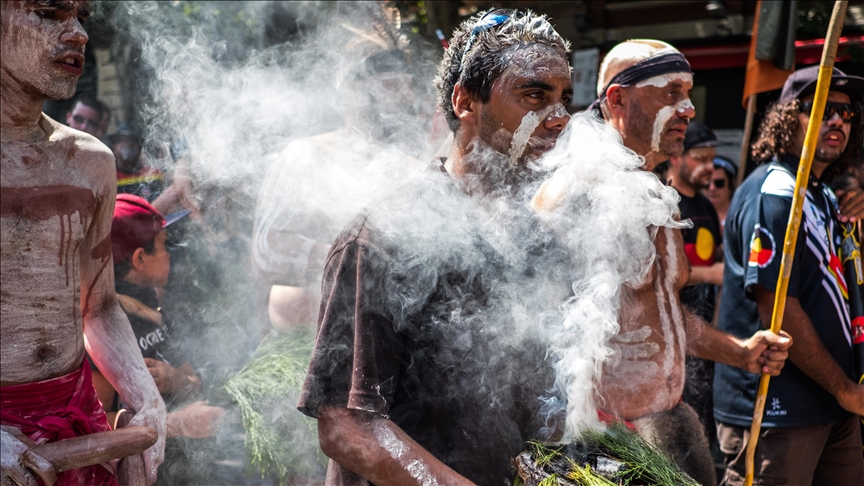CCTV footage shows indigenous children in isolation cells, distressed
Anadolu staff |17.07.2024 -

ANKARA
An investigative documentary aired by a local broadcaster shines a spotlight on Australia's treatment of children from indigenous communities.
CCTV footage shows indigenous children being placed in isolation cells in a state of distress. One video features a 14-year-old Indigenous girl, referred to as Sam, being put into an isolation cell at a Cairns watch house. The First Nations girl from Cairns city in Queensland, who has severe intellectual disabilities, struggles with police and tries to escape until her arm is caught in the door.
Sam, whose name has been changed for the documentary, was placed in isolation after being found throwing toilet paper at a CCTV camera. Her grandmother says Sam has the mental capacity of a kindergarten child and the language skills of a three-year-old and has been deemed unfit to stand trial in court.
Footage obtained from a year-long investigation by SBS and Guardian Australia shows Sam, then 13, becoming increasingly distressed after being brought to the cell and trying to escape multiple times. On her fourth attempt, her arm was caught in the door, causing her to scream in pain. She was later taken to a hospital and placed in leg shackles, with police records indicating concerns that her arm was broken. Two months later, Sam was arrested again and placed back into isolation.
The investigation highlights long-standing human rights concerns about the treatment of children in Queensland's police watch houses. These facilities, often attached to police stations, are intended to hold adult offenders for short periods, particularly when they are drunk or disorderly. However, children as young as 11 are being held there for extended periods, sometimes alongside adults.
Police squads targeting child offenders, such as Taskforce Guardian in Queensland, have arrested more than 1,400 children over the past year. Last year, the Queensland government amended the state's Human Rights Act to permit holding children in watch houses.
Queensland's Youth Justice Minister Di Farmer stated that the system has sufficient checks and balances to prevent and address abuse and mistreatment. "I make no apology for keeping the community safe. So if a young person is a risk to themselves or to the community, then they will be detained, and they are in detention or in a watch house because a court has judged that they be placed there."
Queensland Police declined multiple requests for comment but stated that when a young person is taken into custody, their physical and mental health are assessed. They did not comment on specific cases but acknowledged awareness of allegations, stating that these would be investigated.
An investigative documentary aired by a local broadcaster shines a spotlight on Australia's treatment of children from indigenous communities.
CCTV footage shows indigenous children being placed in isolation cells in a state of distress. One video features a 14-year-old Indigenous girl, referred to as Sam, being put into an isolation cell at a Cairns watch house. The First Nations girl from Cairns city in Queensland, who has severe intellectual disabilities, struggles with police and tries to escape until her arm is caught in the door.
Sam, whose name has been changed for the documentary, was placed in isolation after being found throwing toilet paper at a CCTV camera. Her grandmother says Sam has the mental capacity of a kindergarten child and the language skills of a three-year-old and has been deemed unfit to stand trial in court.
Footage obtained from a year-long investigation by SBS and Guardian Australia shows Sam, then 13, becoming increasingly distressed after being brought to the cell and trying to escape multiple times. On her fourth attempt, her arm was caught in the door, causing her to scream in pain. She was later taken to a hospital and placed in leg shackles, with police records indicating concerns that her arm was broken. Two months later, Sam was arrested again and placed back into isolation.
The investigation highlights long-standing human rights concerns about the treatment of children in Queensland's police watch houses. These facilities, often attached to police stations, are intended to hold adult offenders for short periods, particularly when they are drunk or disorderly. However, children as young as 11 are being held there for extended periods, sometimes alongside adults.
Police squads targeting child offenders, such as Taskforce Guardian in Queensland, have arrested more than 1,400 children over the past year. Last year, the Queensland government amended the state's Human Rights Act to permit holding children in watch houses.
Queensland's Youth Justice Minister Di Farmer stated that the system has sufficient checks and balances to prevent and address abuse and mistreatment. "I make no apology for keeping the community safe. So if a young person is a risk to themselves or to the community, then they will be detained, and they are in detention or in a watch house because a court has judged that they be placed there."
Queensland Police declined multiple requests for comment but stated that when a young person is taken into custody, their physical and mental health are assessed. They did not comment on specific cases but acknowledged awareness of allegations, stating that these would be investigated.
No comments:
Post a Comment